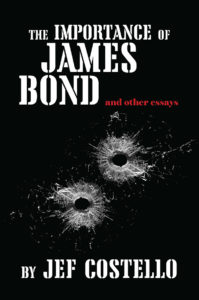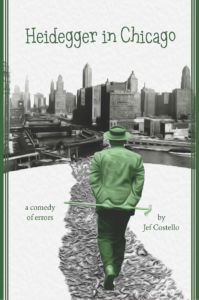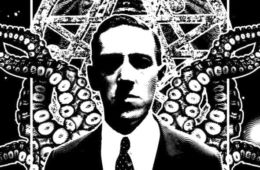Are We (Finally) Living in the World of Atlas Shrugged? Part 1
Part 1 of 2
They say that libertarianism and Ayn Rand’s Objectivism are gateway drugs to the radical Right. I am living proof of this. Many years ago, whenever we saw signs of breakdown or inefficiency in our society, my Objectivist friends and I would all cluck “We’re living in the world of Atlas Shrugged!” Oddly, we felt a certain satisfaction in that. But it was quite silly, because today the world of 30 or 35 years ago seems almost like a lost Eden. Now, however, the moment has truly arrived, and we are finally there. We are living in the world of Atlas Shrugged. Sort of.
Faithful readers may recall my recent retrospective essay on Rand’s The Fountainhead. On a whim I reread the novel, 37 years after initially discovering it. I had such a good time, I decided to go the whole hog and reread Atlas Shrugged, which I originally devoured immediately after finishing The Fountainhead. This was a serious commitment on my part, since Atlas Shrugged is ungodly long: 1,168 pages in the original hardcover edition. But the investment of time has been well worth it. In significant ways, Atlas Shrugged now seems more relevant than ever before.
Much of what Rand projected as America’s possible future seemed implausible when the novel was published in 1957, and for many years thereafter. But it no longer seems implausible; indeed, Atlas Shrugged now seems prophetic. Funny how this always happens with the last century’s dystopian novels, isn’t it? However, there is much that Rand got wrong, and much that she did not foresee. The same, of course, could be said of Orwell, Huxley, and Bradbury. Rand’s errors are quite interesting in themselves — for what they reveal about Rand herself and her limitations, and about the wrongheadedness of “libertarianism.” What Rand got wrong is also interesting — perhaps most interesting — for what it says about the madness of the present day and how utterly unpredictable our world would have been in 1957.
For the uninitiated, I will very briefly summarize the plot. In the world of Atlas Shrugged, all countries, save the United States, have become what Rand refers to as “people’s states” (no other country that is not a “people’s state” is mentioned). Oddly, Rand never once in the novel uses the terms “Communism” or “socialism.” This is probably because her aim was to critique the fundamental, and centuries-old moral principles underlying these systems. Thus, she did not want to focus narrowly on some particular political theory, and she had absolutely no interest in making fine distinctions between types of socialism. Nevertheless, it’s clear that the “people’s states” are Marxist hellholes that have reached, when the story opens, a Venezuela-level of collapse.

You can buy Jef Costello’s The Importance of James Bond here
The US is not yet a people’s state, but it is rapidly on its way to becoming one. In the name of fighting economic inequality and “greed,” the government has introduced legislation that throttles innovation, eliminates competition, and makes businessmen dependent upon “pull” and political favors. Success and ability are penalized; failure and incompetence are rewarded. Laws bear amusing names such as “The Anti-dog-eat-dog Rule” and the “Equalization of Opportunity Bill.” Industry dries up, and with it entire cities and towns. Basic necessities become scarce and there are “supply chain issues.”
In Washington, the grey men are in charge: men who mouth high-minded slogans while gaming the system to acquire wealth and power. At the helm is Mr. Thompson, a tired, corrupt, colorless cynic without any redeeming features — a man rather uncannily reminiscent of Joe Biden. Mr. Thompson, whose first name is never mentioned, is apparently supposed to be the President. Oddly, however, he is never referred to or addressed as such, but is described only as “the head of state.” His men pass so many rules and regulations that it is impossible to live without breaking them. Every adult is walking around an unindicted felon.
The justice system becomes a means to coerce men into cooperating with the establishment — but any charge can be dropped, provided one has enough cash or political pull. It is a government of men and not of laws. A woozy relativism pervades the society: “Who’s to say?” “Who can know?” “Who’s to judge?” Bad philosophy reigns: “No one can know anything”; “Truth is relative”; “There is no such thing as objective reality”; “There are no absolutes”; “Those are your facts, your truth!” (okay, that last one is not in Atlas Shrugged — but it could have been!). No one seems willing to take responsibility for his actions, or even for his own existence. “I never had a chance!” and “I couldn’t help it!” are refrains heard throughout the book.
We witness most of this through the eyes of the novel’s main character, Dagny Taggart, Operating Vice-President of Taggart Transcontinental, the country’s largest and most vital railroad. Day by day, Dagny fights a losing battle to keep the trains running, despite the depredations of the “looters” and “moochers.” Her spirits are buoyed by the friendship of some of her fellow industrialists — the few men left in the country who are competent, hard-working, and innovative. One by one, however, she sees these men quit, close their companies, and vanish into thin air. Dagny begins to suspect that a “destroyer” is on the loose, convincing “the men of the mind” to drop out of society.
Her suspicions are confirmed when, in a stroke of luck, she happens to catch sight of the destroyer, just as he departs an airfield in a private plane, his latest conquest at his side. Dagny gives chase in her own plane, and crash lands in a mysterious valley whose existence is concealed by a sci-fi “ray screen” which projects a mirage over the entire area (I kid you not). In the valley, she finds all the men of the mind who had left their work and vanished. They explain to her that they are “on strike”: They have left the world to the looters, and are waiting for their system to finally collapse. When it does, they will return and build a new world out of the ruins — a world built on the principle that a man’s happiness and success are the moral purpose of his life, and that no man should live for the sake of another. The strikers invite Dagny to join them.
To reveal more would be unconscionable (in fact, I may have already revealed too much). It is impossible to adequately describe the effect that Atlas Shrugged had on me when I read it at the tender age of 20. As I said in my essay on The Fountainhead, “It felt like an entirely new world had opened up for me.” Reading the novel each day caused me to enter into a state of near ecstasy. I fell in love with Atlas and its author, and for about four years thereafter I probably would have committed murder for Ayn Rand, or at least helped her to move a body. I have read better books since then, but none has filled me with such excitement.
When I tell this to people they usually smile rather condescendingly and remark that I encountered Rand “at the right age.” Indeed, most people get into Rand when they are quite young; seldom have I encountered a middle-aged convert (though I know that they exist). People infer from this a deficiency in Rand: her works are naïve, simplistic, and overly idealistic, so no wonder they appeal to the young. In fact, this is true. But what is also true is that the inability of older folks to respond to Rand is also partly a reflection of their own shortcomings. Much of Rand is naïve and simplistic — but she also stands for values such as an unwavering commitment to truth, to living a life based on reason, to independence, to creativity, to integrity, and to justice (real justice, not “social justice”). If we reach an age where we respond to such values with cynicism, then shame on us.
We have still not gotten to the point where a dispassionate consideration of the merits of Rand’s fiction is possible for most scholars. Most of what is written about Rand is penned either by passionate devotees or by passionate detractors. Rand’s fiction is almost universally treated as didactic art — as existing solely to put forward an ideology. And the ideology is so controversial, and so hated by most scholars and critics (who are, of course, Leftists) that it dominates almost all discussion of Rand’s work. Intelligent discussion of the literary merits of her novels is almost non-existent. No doubt eventually this will change.
As a piece of literature, Atlas Shrugged is a mixed bag. I have already mentioned its great length. At more than a thousand pages, one expects a complex plot, and Rand delivers one that is quite extraordinary. There are numerous subplots, as well as countless minor characters. Amazingly, Rand is so skillful a writer that one has absolutely no difficulty keeping it all straight. If I recommend the book to friends, everyone — and I mean everyone — balks at the novel’s length. I always tell them “It’s a page-turner,” though I’m not sure they believe me. But it is quite true. The novel is hard to put down, and I know one individual who read all of Atlas in one weekend.
The book defies categorization in terms of genres. The dust jacket description of Atlas (written by Rand herself) refers to it as a mystery story “not about the murder of a man’s body, but about the murder — and rebirth — of man’s spirit.” Atlas Shrugged is also a romance (Dagny finds herself caught not in a love triangle, but in a love quadrangle). It is a political thriller, an action thriller, and a philosophical thriller. As already mentioned, it is dystopian fiction — though it contains its own sketch of utopia (located in that aforementioned mysterious valley). Finally, and perhaps most surprising of all, Atlas is a science fiction novel. I have already mentioned the “ray screen,” but readers who take the plunge and immerse themselves in Atlas will also discover a motor that operates by drawing static energy from the atmosphere, a sonic superweapon codenamed “Project X,” and a few other sci-fi tidbits.
No one seems interested in exploring the obvious point that Rand, a Russian Jew born in St. Petersburg in 1905, belongs to the Russian literary tradition. She received a classical education, even under the Soviets, and read all the great Russian literary figures, though she only responded strongly to Dostoevsky. Rand’s fiction is classically Russian in many respects. There is, first of all, its War and Peace-like length and complexity. Then there is its implacable moralism, a trait she shares with Dostoevsky. As in Dostoevsky, Rand’s novels are also replete with lengthy philosophical conversations between characters who remain, for the average reader, intellectually and emotionally remote. Some characters deliver extremely long speeches. The most notorious instance of this occurs in Atlas Shrugged, in which the leader of “the strike,” John Galt, makes a speech that spans exactly 60 pages. I can find no literary parallel for this; Ivan’s “Grand Inquisitor” speech in The Brothers Karamazov is only about a third of the length of Galt’s speech.
Critics often sneer at the names Rand gives to her characters. Most of the positive characters have dignified names, and many are Irish (Roark, Galt, Rearden, Taggart, etc.), in homage to Rand’s husband Frank O’Connor. The negative characters, however, typically bear names that clearly and comically express their loathsomeness. There is a host of these in Atlas Shrugged: Wesley Mouch, Cuffy Meigs, Tinky Holloway, Balph Eubank, Bertram Scudder, Orren Boyle, Claude Slagenhop, and many others. This, too, is Russian. The main character of Gogol’s classic tale “The Overcoat” is Akaky Akakievich, whose name basically means “Shit Shitovich.” Crime and Punishment’s protagonist is Raskolnikov, which comes from raskolnik, meaning “dissenter.” Many other examples could be mentioned.
Of course, the “Russianness” of Rand’s fiction is not necessarily a virtue. One of the major defects of Atlas Shrugged is precisely its long philosophical conversations, as well as the frequent philosophical observations made by Rand as omniscient narrator. These sometimes go on for pages, and hammer home the same points over and over again. And there is simply no excuse for a speech lasting 60 pages — especially given that virtually every point in it has been made earlier in the novel, sometimes repeatedly. Rand spent 14 years writing Atlas, fully two of which were spent writing Galt’s speech. Had I invested that much time in a text, I might be loath to cut it as well. But most first-time readers either skim the speech or skip it entirely. By the time you get to page 1009, where the speech begins, you already know most of what Galt is going to say.
Rand called her genre of fiction “romantic realism.” As in the works of authors such as Victor Hugo, Alexandre Dumas, and Edmond Rostand, Rand has her characters speak and act not as men actually do, but as they might do and ought to do. They speak beautifully, in other words, and act heroically. An optimistic “sense of life” predominates: Heroism really is possible for Rand, and in the end the heroes win. Rand despised what she called “naturalism,” with its pessimism and fatalism. Unlike other romantic novelists, however, Rand did not set her stories in an earlier era, nor did she write fantasies (though, as should be clear by now, there is an element of fantasy in Atlas Shrugged). She rejected the implicit premise in such fiction that great deeds and beautiful words are things that had been possible, but only long ago. Instead, her novels are set in the present — hence “romantic realism.” Imagine D’Artagnan, Athos, Aramis, and Porthos not swashbuckling in the seventeenth century, but running a transcontinental railroad, smelting ore, or building skyscrapers in the twentieth.
Thus, the oft-heard criticism that Rand’s dialogue and situations are “unrealistic” simply misses the whole point. Those who demand that kind of realism should be reading Émile Zola, not Rand. Nevertheless, it is true that some of the dialogue in Atlas is genuinely melodramatic, and at times the situations verge on pulp fiction (in Atlas Rand was, indeed, consciously drawing on the boys’ adventure stories she read as a child, especially Maurice Champagne’s 1914 novel The Mysterious Valley). Further, Rand’s portrayals of the negative characters in Atlas verge on caricature. This, too, is actually a consequence of Rand’s commitment to romantic realism. Her characters are supposed to express the distilled essence, as well as the consequences, of certain sorts of ideas. The result is often that their depiction contains brilliant commentary — but at the price of making the characters implausible. In Atlas, this is especially true of Rand’s portrayal of Jim Taggart, Dagny’s brother, who is such a subjectivist, a whim-worshipper, an evader, and a gutless wonder that he is simply not a believable character. This is a problem for Rand, since readers who respond to such characters with “no one’s that bad” are liable to be skeptical about her other observations on life and human nature. In fairness, I do have to add that today’s whining snowflakes and screeching social justice warriors are not far removed from Rand’s villains — and just as impossible to parody.

You can buy Jef Costello’s Heidegger in Chicago here
In my essay on The Fountainhead, I discussed Rand’s misanthropy. This is on full display in Atlas — indeed, if anything Atlas is far more misanthropic. In 1957, reviewers picked up on this and one (writing for The New York Times) said that the book was “written out of hate.” Objectivists tend to laugh at this — and, truly, any time a Leftist uses the word “hate” ought to be an occasion for mirth. Still, the guy was actually onto something here. The “hate” in Atlas reaches a crescendo in one of the novel’s most memorable events: the Taggart Tunnel disaster.
The engine of the transcontinental Taggart Comet breaks down just as it is about to enter the nine-mile Taggart Tunnel, which cuts its way through the Rockies. One of the passengers, a politician, threatens to use political pull to get Taggart employees fired if another engine is not supplied immediately. Since no diesel engine is available, they attach a coal-burning locomotive to the train, knowing that the smoke from the engine will asphyxiate everyone on board before they get halfway through the tunnel. No one, however, is willing to take responsibility for saying “no” to a Washington fat cat, or even to face the reality that they are sentencing the passengers to death.
In perhaps the darkest sequence in all Rand’s fiction, she describes the passengers who are about to die: a Marxist sociologist, a Leftie journalist, a businessman who got rich through political connections, a professor of economics who advocates the abolition of private property, a playwright who portrays all businessmen as scoundrels, a professor of philosophy who teaches skepticism and relativism, a “humanitarian” who believes that men of ability must be penalized to support the incompetent, etc. All these people, Rand explicitly claims, are collectively responsible for the breakdown in order, morals, and brains that has led to this moment. And all of them perish. In effect, Rand is saying that they all deserve to be gassed. From this perspective, one actually feels some sympathy for Whittaker Chambers, author of the most notorious hit job on Atlas (published in National Review), who wrote “From almost any page . . . a voice can be heard, from painful necessity, commanding: ‘To a gas chamber — go!’”
In short, Atlas Shrugged is a book that is marred by excesses of all kinds. Nevertheless, it is one of the most extraordinary novels in all literature — in part, because of its excesses. Atlas possesses both great virtues, and great flaws. The flaws are very real — yet at the same time there is something grand about them. You have to admire Rand for the sheer audacity of what she accomplished, even where it detracts from the whole: the huge speeches, the huge page count, the gee-whiz sci-fi, the corny dialogue, the unapologetic and almost naïve romanticism — all served up with a torrential outpouring of hatred for every soul weaker and dimmer than hers. This is a woman who truly didn’t give a damn. You have to love her. At least, I do.






